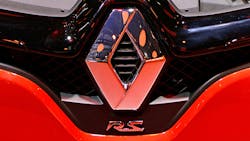Another Day, Another Scandal: Renault Latest Dieselgate Target
PARIS — A year and a half after Volkswagen’s “dieselgate” erupted, Paris prosecutors are probing Renault over possible “cheating” in diesel emissions, sending the carmaker’s shares sliding on the stock exchange.
While VW is still counting the cost of an unprecedented emissions scandal that shook not only the auto sector, but the whole of German industry to the core, similar allegations are now being levied against other carmakers, notably Italian-American giant Fiat Chrysler and France’s Renault.
Just a day after U.S. officials said VW would plead guilty to three criminal charges and pay a total of $4.3 billion in fines to settle its scandal, the Environmental Protection Agency charged that Fiat Chrysler had hidden software on diesel trucks that allowed them to spew out excess emissions.
And then on Friday, prosecutors said they’d look into possible cheating by Renault after independent French experts found dangerously high levels of emissions from diesel engines of several carmakers, including Renault.
Renault shares were showing a loss of 1.5% at 84.95 euros ($90.19), while the overall CAC 40 index was up by around 1.0%. The shares had plunged by more than more than 4% immediately after the announcement.
Renault insisted its engines complied “with French and European regulations”.
“Renault vehicles are all and have always been homologated in accordance with the laws and regulations. They are compliant with the applicable standards. … Renault vehicles are not equipped with cheating software affecting anti-pollution systems.”
For its part, Fiat Chrysler also denied the charges and pledged to work with President-elect Donald Trump’s administration to resolve the issue “fairly”. But Britain has lodged an urgent request with U.S. authorities for information on the allegations against Fiat Chrysler.
The EPA said undisclosed software on the 2014 to 2016 models of Grand Cherokees and Dodge Ram 1500 trucks sold in the United States allowed the vehicles to emit more nitrogen oxides than permitted.
The EPA is working with the California Air Resources Board (CARB), which originally accused VW and is also investigating Fiat Chrysler.
Despite the accusations, Fiat Chrysler reaffirmed its earnings targets for 2018: “We confirm our targets. This issue won’t impact our programmes,” Fiat Chrysler CEO Sergio Marchionne said in an interview with a number of Italian media.
The group is aiming to lift sales to 136 billion euros ($144.52 billion) by 2018, compared with 113 billion euros ($120.08 billion) in 2015. Bottom-line profits are projected to come out at 4.7-5.5 billion euros ($4.99-$5.84 billion), compared with 2 billion euros ($2.13 billion) in 2015.
But the EPA said that Fiat Chrysler could face fines of up to $4.6 billion.
“We haven’t committed any fraud. This is not at all comparable to the Volskwagen affair,” Marchionne said. ”Volkswagen put in place a device that was able to distinguish whether the vehicle was undergoing an emissions test or whether it was out on the road,” while Fiat Chrysler’s did not, he insisted.
“Our diesel engines were built by European technicians who are used to European norms. That could the cause of the problem,” he continued. ”I don’t think that these issues are insurmountable.”
The accusations had sent Fiat Chrysler shares more than 16% lower in Milan on Thursday, but they bounced back on Friday, showing a gain of 4.4%.
“The case is different to the Volkswagen one,” said Equita analysts.
It was difficult to make any predictions about the possible financial consequences for Fiat Chrysler, but the estimation of a possible fine of $4.6 billion seemed “excessive,” they said.
Copyright Agence France-Presse, 2017
About the Author
Agence France-Presse
Copyright Agence France-Presse, 2002-2025. AFP text, photos, graphics and logos shall not be reproduced, published, broadcast, rewritten for broadcast or publication or redistributed directly or indirectly in any medium. AFP shall not be held liable for any delays, inaccuracies, errors or omissions in any AFP content, or for any actions taken in consequence.
